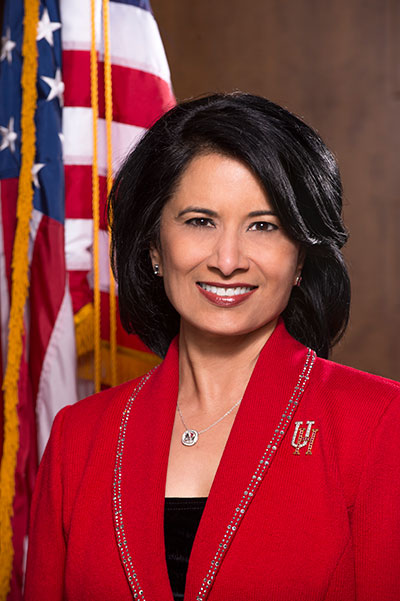
The council, which is made up of 23 members including college presidents, academic leaders and interagency partners, provides advice and recommendations to the Secretary on matters related to homeland security and the academic community. Since its formation in 2012, members have issued more than 120 recommendations in the areas of academic research and faculty exchange, campus resilience, cybersecurity, international students, DHS academic programs and recruitment of current students and recent graduates.
Khator, who will serve a four-year term on the council effective immediately, was selected by DHS based on her expertise in higher education leadership and UH’s leadership in homeland security research.
UH is the lead institution for the DHS Center of Excellence for Borders, Trade and Immigration Research, awarded in late 2015, and one of only three universities in Texas with dual designation by the National Security Agency and the Department of Homeland Security for its educational and research programs in cybersecurity and cyber defense. In addition, DHS has provided the University of Houston funding to conduct research on making biochemical threat detection economically sustainable. DHS has also awarded a grant to UH to develop technology to help protect emergency response systems against Distributed Denial of Service (DDoS) cyber attacks.
“Serving on this council is both an honor and a serious responsibility,” said Khator. “There can be no more important task than maintaining the safety of our country. Through research, innovation and workforce development, higher education must continue to play a vital role in helping DHS meet that crucial objective.”
“What President Khator brings is not only a deep understanding of the issues facing our campuses but also a firm grasp of the mission of DHS through her work at the University of Houston,” said Trent Frazier, executive director of the Office of Academic Engagement. “DHS and OAE are excited to further collaborate with her.”
Khator joined the UH System in 2008 and oversees a four-university organization that serves nearly 70,000 students, has an annual budget that exceeds $1.7 billion and generates nearly $6 billion economic impact on the Greater Houston area each year. In 2011, the system’s flagship university, UH, earned Tier One status from the Carnegie Foundation and in 2016 was awarded a Phi Beta Kappa chapter.
Khator, who holds a Ph.D. in political science and public administration from Purdue University, serves as chair of the Federal Reserve Bank of Dallas Board of Directors and is the immediate past president of the American Council on Education (ACE). In addition, she is a member of the NCAA Division I Presidential Forum. She is the first female chancellor of a Texas higher education system and the first Indian immigrant to head a comprehensive public research university in the United States.
Other new HSAAC member announced by Secretary Johnson include Eric Barron, president, Pennsylvania State University; Bruce Benson, president, University of Colorado; Carol Leary, president, Bay Path University; David Pershing, president, University of Utah; Robert Scott, president emeritus, Adelphi University; Kent Syverud, chancellor and president, Syracuse University; and Michael Young, president, Texas A&M University.
For more information about HSAAC, visit https://www.dhs.gov/homeland-security-academic-advisory-council-hsaac.